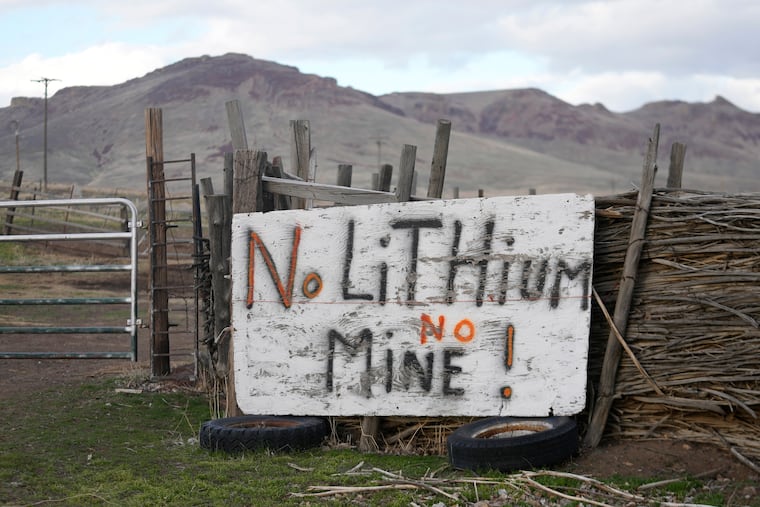Electric vehicles are not without environmental consequences
Lithium mining for EV batteries perpetuates some of the same harm as gas-powered vehicles.

Pennsylvania is the country’s third-largest producer of electricity, behind only Texas and Florida. The bulk of our state’s energy comes from coal, gas, and nuclear. Solar, wind, and hydropower account for only 3% of Pennsylvania’s energy production, yet left-wing environmental groups have been attacking the development of our state’s abundant natural resources, saying they pollute the Earth and are the cause of climate change.
Earlier this year, the State College, Pa.-based company EC Power and Flux Power, a battery manufacturer based in San Diego, announced plans to build a lithium-ion battery factory in Philipsburg, Pa., potentially bringing 150 jobs to the region. Those batteries power the electric vehicles that environmentalists promise will save the Earth.
What the environmental left fails to grasp is there is no panacea. All solutions have a cost.
Electric vehicles are not without environmental consequences. There are swaps and trade-offs necessary to power the modern world while protecting the environment. Denigrating oil and gas while ignoring the environmental consequences of mining lithium for electric-powered vehicles undermines the moral superiority that environmentalists exhibit to shame the rest of us.
Even Michael Bloomberg, who recently dedicated his fortune to a war on petrochemicals, acknowledges the unreasonableness exhibited by many on the left. “We are not going to get away from using oil for the next 10 or 15 years,” Bloomberg remarked at a recent Climate Summit hosted by the New York Times, “and we are not going to say everybody that has a gas-guzzling car can’t drive it anymore, and they will have to start walking today. You have to be practical.”
But that’s not happening, and Bloomberg is part of the problem. He and other environmentalists fail to recognize that the very harms they acknowledge from climate change — namely, the destruction of Indigenous peoples’ lands and way of life — also happen with lithium mining.
South America’s “Lithium Triangle” — where Bolivia, Chile, and Argentina meet — is home to 67% of the world’s lithium reserves, and is where most mining now takes place. As Carlos Guzman, an Indigenous man living near Argentina’s border with Chile, told the Washington Post in 2016, “These lands are ancestral. We live by this. By the fields. By our cattle. This way of life is in danger.”
To be sure, not every Indigenous person is against lithium mining — the same article notes that the mining has created jobs and economic opportunities where there aren’t many.
Similar opposition has unfolded in Nevada, where a group of Indigenous people called People of Red Mountain oppose the proposed Thacker Pass Lithium Mine near the border of Nevada and Oregon. The mine is a central part of President Joe Biden’s clean energy agenda.
The impacts of lithium mining could be coming home to Pennsylvania soon. Experts are eyeing our state’s potential for extracting rare earth minerals, and have discovered highly concentrated lithium in Pennsylvania’s Marcellus Shale.
No creation of energy is environmentally neutral. Unless we all want to slap on a fig leaf and return to the nomadic life on foot, there are consequences to our actions, both good and bad. That’s why a balanced approach to energy is so important.
But that’s not what’s happening. While fighting to hamper safe and affordable natural gas production in Pennsylvania, two of the largest environmental groups in the state — PennEnvironment and the Pennsylvania Environmental Council — are pushing for more government subsidies for battery-powered electric vehicles.
They do this while claiming that electric vehicles reduce pollution — when lithium mining has been shown to harm the soil, contaminate the air and groundwater, destroy ecosystems, and force Indigenous people out of their ancestral lands.
No one is for this. That’s why the government needs to get out of the business of picking winners and losers in the energy sector and focus instead on positive incentives for the free market to effectively address environmental issues.
I find it hard to believe that the well-funded environmental movement — packed with scholars and experts at leading institutions, including in the government — lacks the basic knowledge and resources required to acknowledge the environmental issues with lithium.
Ignoring results that do not comport with one’s worldview is a credibility killer.
Instead of denigrating skeptics — as Biden did when he called those who disagree “lying, dog-faced pony soldiers” — environmentalists should look at their cognitive dissonance on issues like lithium as the reason so many people doubt the truthfulness and authenticity of their claims.
Just last year, Biden said, “Great nations don’t hide from their history.” Great nations don’t hide from their hypocrisy, either. If past Americans got our energy system wrong, then perhaps the president and his environmentalist allies should stop patterning their behavior on past imperialism, and instead show us how to do it right.